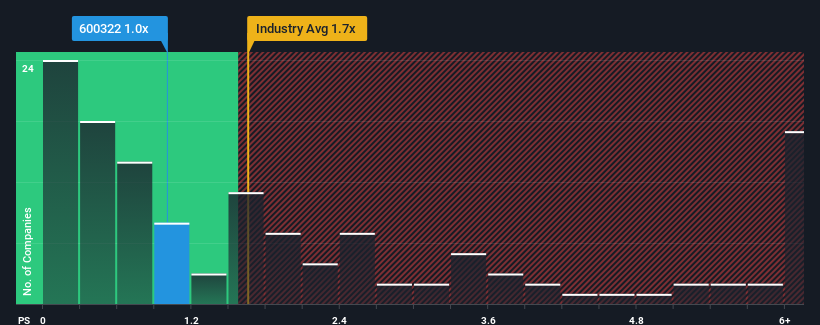- China
- /
- Real Estate
- /
- SHSE:600322
Tianjin Jintou State-owned Urban Development Co., Ltd.'s (SHSE:600322) Business And Shares Still Trailing The Industry
With a price-to-sales (or "P/S") ratio of 1x Tianjin Jintou State-owned Urban Development Co., Ltd. (SHSE:600322) may be sending bullish signals at the moment, given that almost half of all the Real Estate companies in China have P/S ratios greater than 1.7x and even P/S higher than 4x are not unusual. Although, it's not wise to just take the P/S at face value as there may be an explanation why it's limited.
Check out our latest analysis for Tianjin Jintou State-owned Urban Development

How Tianjin Jintou State-owned Urban Development Has Been Performing
For example, consider that Tianjin Jintou State-owned Urban Development's financial performance has been poor lately as its revenue has been in decline. It might be that many expect the disappointing revenue performance to continue or accelerate, which has repressed the P/S. However, if this doesn't eventuate then existing shareholders may be feeling optimistic about the future direction of the share price.
Although there are no analyst estimates available for Tianjin Jintou State-owned Urban Development, take a look at this free data-rich visualisation to see how the company stacks up on earnings, revenue and cash flow.Do Revenue Forecasts Match The Low P/S Ratio?
Tianjin Jintou State-owned Urban Development's P/S ratio would be typical for a company that's only expected to deliver limited growth, and importantly, perform worse than the industry.
Retrospectively, the last year delivered a frustrating 70% decrease to the company's top line. This means it has also seen a slide in revenue over the longer-term as revenue is down 34% in total over the last three years. Therefore, it's fair to say the revenue growth recently has been undesirable for the company.
Weighing that medium-term revenue trajectory against the broader industry's one-year forecast for expansion of 8.6% shows it's an unpleasant look.
With this in mind, we understand why Tianjin Jintou State-owned Urban Development's P/S is lower than most of its industry peers. Nonetheless, there's no guarantee the P/S has reached a floor yet with revenue going in reverse. There's potential for the P/S to fall to even lower levels if the company doesn't improve its top-line growth.
What Does Tianjin Jintou State-owned Urban Development's P/S Mean For Investors?
We'd say the price-to-sales ratio's power isn't primarily as a valuation instrument but rather to gauge current investor sentiment and future expectations.
Our examination of Tianjin Jintou State-owned Urban Development confirms that the company's shrinking revenue over the past medium-term is a key factor in its low price-to-sales ratio, given the industry is projected to grow. Right now shareholders are accepting the low P/S as they concede future revenue probably won't provide any pleasant surprises either. Given the current circumstances, it seems unlikely that the share price will experience any significant movement in either direction in the near future if recent medium-term revenue trends persist.
Having said that, be aware Tianjin Jintou State-owned Urban Development is showing 2 warning signs in our investment analysis, and 1 of those can't be ignored.
If strong companies turning a profit tickle your fancy, then you'll want to check out this free list of interesting companies that trade on a low P/E (but have proven they can grow earnings).
Valuation is complex, but we're here to simplify it.
Discover if Tianjin Jintou State-owned Urban Development might be undervalued or overvalued with our detailed analysis, featuring fair value estimates, potential risks, dividends, insider trades, and its financial condition.
Access Free AnalysisHave feedback on this article? Concerned about the content? Get in touch with us directly. Alternatively, email editorial-team (at) simplywallst.com.
This article by Simply Wall St is general in nature. We provide commentary based on historical data and analyst forecasts only using an unbiased methodology and our articles are not intended to be financial advice. It does not constitute a recommendation to buy or sell any stock, and does not take account of your objectives, or your financial situation. We aim to bring you long-term focused analysis driven by fundamental data. Note that our analysis may not factor in the latest price-sensitive company announcements or qualitative material. Simply Wall St has no position in any stocks mentioned.
Have feedback on this article? Concerned about the content? Get in touch with us directly. Alternatively, email editorial-team@simplywallst.com
About SHSE:600322
Tianjin Jintou State-owned Urban Development
Tianjin Jintou State-owned Urban Development Co., Ltd.
Good value with imperfect balance sheet.
Market Insights
Community Narratives



